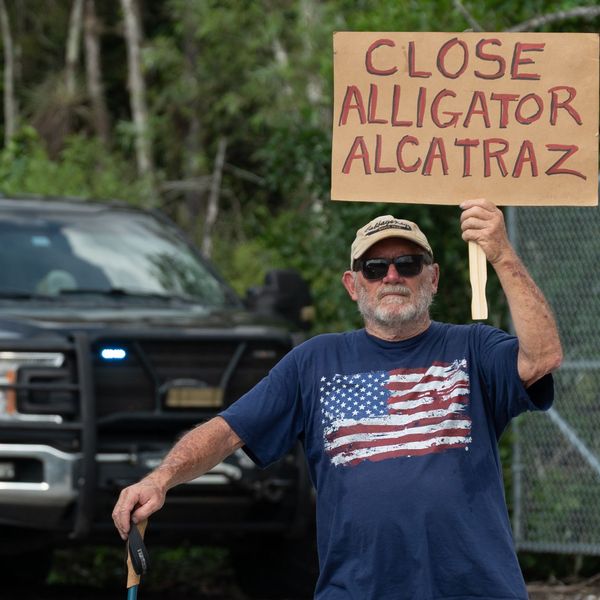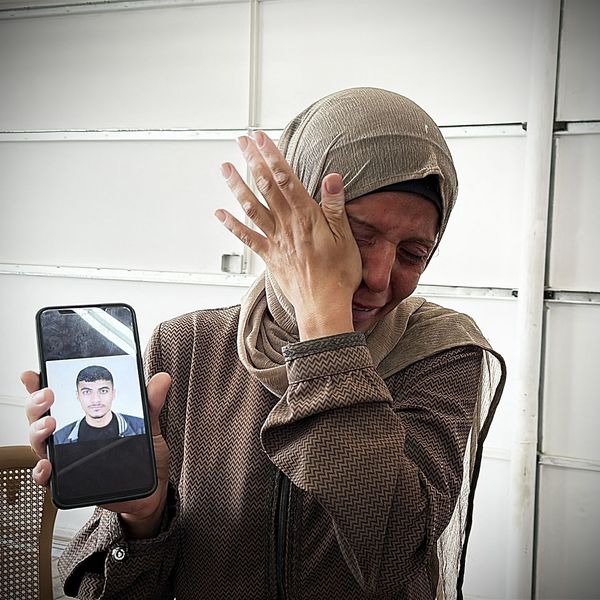California Prisoners End Hunger Strike Against 'Systemic State Sanctioned Torture'
'Peaceful Protest of Resistance' against solitary confinement to continue, they vow
California inmates ended on Thursday their over two-month hunger strike in "nonviolent peaceful protest of . . . decades of indefinite state-sanctioned torture, via long term solitary confinement."
The historic strike began at the Security Housing Unit (SHU) in Pelican Bay State Prison but quickly spread to other prisons across the state, and included as many as 30,000 inmates at one point.
In a statement, representatives of the hunger strikers said that they "deemed it to be in the best interest of our cause to suspend our hunger strike action until further notice."
In addition to the human rights violations from long-term solitary confinement, California prison officials were slammed by human rights advocates for getting a green light to force-feed prisoners during the hunger strike, which stands in violation of international laws.
During the hunger strike, prison officials punished strike leaders with what the inmates called "more torturous conditions than in the [solitary housing units].
The Center for Constitutional Rights, which applauded the inmates' struggle for dignity and humane treatment, said that the protest "secured legislative hearings that will examine the disgraceful and inhumane conditions that thousands of prisoners in solitary confinement have endured for many years." The group added that while the hearings are welcome, "the unconstitutional conditions that sparked the strike remain."
Because those unconstitutional conditions remain, the inmates emphasized that while the hunger strike has ended, their struggle for justice has not, stating, "our Peaceful Protest of Resistance to our continuous subjection to decades of systemic state sanctioned torture via the system's solitary confinement units is far from over."
They continue:
Our goal remains: force the powers that be to end their torture policies and practices in which serious physical and psychological harm is inflicted on tens of thousands of prisoners as well as our loved ones outside. We also call for ending the related practices of using prisoners to promote the agenda of the police state by seeking to greatly expand the numbers of the working class poor warehoused in prisons, and particularly those of us held in solitary, based on psychological/social manipulation, and divisive tactics keeping prisoners fighting amongst each other. Those in power promote mass warehousing to justify more guards, more tax dollars for "security", and spend mere pennies for rehabilitation -- all of which demonstrates a failed penal system, high recidivism, and ultimately compromising public safety. The State of California's $9.1 billion annual CDCR budget is the epitome of a failed and fraudulent state agency that diabolically and systemically deprives thousands of their human rights and dignity. Allowing this agency to act with impunity has to stop! And it will.
* * *
Shane Bauer was one of the American hikers detained in Iran in 2009 where he was held for 26 months, four of them in solitary. Bauer began investigating solitary confinement in the U.S. shortly after his release, and the video below shows some of this findings from California's Pelican Bay:
________________________
An Urgent Message From Our Co-Founder
Dear Common Dreams reader, The U.S. is on a fast track to authoritarianism like nothing I've ever seen. Meanwhile, corporate news outlets are utterly capitulating to Trump, twisting their coverage to avoid drawing his ire while lining up to stuff cash in his pockets. That's why I believe that Common Dreams is doing the best and most consequential reporting that we've ever done. Our small but mighty team is a progressive reporting powerhouse, covering the news every day that the corporate media never will. Our mission has always been simple: To inform. To inspire. And to ignite change for the common good. Now here's the key piece that I want all our readers to understand: None of this would be possible without your financial support. That's not just some fundraising cliche. It's the absolute and literal truth. We don't accept corporate advertising and never will. We don't have a paywall because we don't think people should be blocked from critical news based on their ability to pay. Everything we do is funded by the donations of readers like you. Will you donate now to help power the nonprofit, independent reporting of Common Dreams? Thank you for being a vital member of our community. Together, we can keep independent journalism alive when it’s needed most. - Craig Brown, Co-founder |
California inmates ended on Thursday their over two-month hunger strike in "nonviolent peaceful protest of . . . decades of indefinite state-sanctioned torture, via long term solitary confinement."
The historic strike began at the Security Housing Unit (SHU) in Pelican Bay State Prison but quickly spread to other prisons across the state, and included as many as 30,000 inmates at one point.
In a statement, representatives of the hunger strikers said that they "deemed it to be in the best interest of our cause to suspend our hunger strike action until further notice."
In addition to the human rights violations from long-term solitary confinement, California prison officials were slammed by human rights advocates for getting a green light to force-feed prisoners during the hunger strike, which stands in violation of international laws.
During the hunger strike, prison officials punished strike leaders with what the inmates called "more torturous conditions than in the [solitary housing units].
The Center for Constitutional Rights, which applauded the inmates' struggle for dignity and humane treatment, said that the protest "secured legislative hearings that will examine the disgraceful and inhumane conditions that thousands of prisoners in solitary confinement have endured for many years." The group added that while the hearings are welcome, "the unconstitutional conditions that sparked the strike remain."
Because those unconstitutional conditions remain, the inmates emphasized that while the hunger strike has ended, their struggle for justice has not, stating, "our Peaceful Protest of Resistance to our continuous subjection to decades of systemic state sanctioned torture via the system's solitary confinement units is far from over."
They continue:
Our goal remains: force the powers that be to end their torture policies and practices in which serious physical and psychological harm is inflicted on tens of thousands of prisoners as well as our loved ones outside. We also call for ending the related practices of using prisoners to promote the agenda of the police state by seeking to greatly expand the numbers of the working class poor warehoused in prisons, and particularly those of us held in solitary, based on psychological/social manipulation, and divisive tactics keeping prisoners fighting amongst each other. Those in power promote mass warehousing to justify more guards, more tax dollars for "security", and spend mere pennies for rehabilitation -- all of which demonstrates a failed penal system, high recidivism, and ultimately compromising public safety. The State of California's $9.1 billion annual CDCR budget is the epitome of a failed and fraudulent state agency that diabolically and systemically deprives thousands of their human rights and dignity. Allowing this agency to act with impunity has to stop! And it will.
* * *
Shane Bauer was one of the American hikers detained in Iran in 2009 where he was held for 26 months, four of them in solitary. Bauer began investigating solitary confinement in the U.S. shortly after his release, and the video below shows some of this findings from California's Pelican Bay:
________________________
California inmates ended on Thursday their over two-month hunger strike in "nonviolent peaceful protest of . . . decades of indefinite state-sanctioned torture, via long term solitary confinement."
The historic strike began at the Security Housing Unit (SHU) in Pelican Bay State Prison but quickly spread to other prisons across the state, and included as many as 30,000 inmates at one point.
In a statement, representatives of the hunger strikers said that they "deemed it to be in the best interest of our cause to suspend our hunger strike action until further notice."
In addition to the human rights violations from long-term solitary confinement, California prison officials were slammed by human rights advocates for getting a green light to force-feed prisoners during the hunger strike, which stands in violation of international laws.
During the hunger strike, prison officials punished strike leaders with what the inmates called "more torturous conditions than in the [solitary housing units].
The Center for Constitutional Rights, which applauded the inmates' struggle for dignity and humane treatment, said that the protest "secured legislative hearings that will examine the disgraceful and inhumane conditions that thousands of prisoners in solitary confinement have endured for many years." The group added that while the hearings are welcome, "the unconstitutional conditions that sparked the strike remain."
Because those unconstitutional conditions remain, the inmates emphasized that while the hunger strike has ended, their struggle for justice has not, stating, "our Peaceful Protest of Resistance to our continuous subjection to decades of systemic state sanctioned torture via the system's solitary confinement units is far from over."
They continue:
Our goal remains: force the powers that be to end their torture policies and practices in which serious physical and psychological harm is inflicted on tens of thousands of prisoners as well as our loved ones outside. We also call for ending the related practices of using prisoners to promote the agenda of the police state by seeking to greatly expand the numbers of the working class poor warehoused in prisons, and particularly those of us held in solitary, based on psychological/social manipulation, and divisive tactics keeping prisoners fighting amongst each other. Those in power promote mass warehousing to justify more guards, more tax dollars for "security", and spend mere pennies for rehabilitation -- all of which demonstrates a failed penal system, high recidivism, and ultimately compromising public safety. The State of California's $9.1 billion annual CDCR budget is the epitome of a failed and fraudulent state agency that diabolically and systemically deprives thousands of their human rights and dignity. Allowing this agency to act with impunity has to stop! And it will.
* * *
Shane Bauer was one of the American hikers detained in Iran in 2009 where he was held for 26 months, four of them in solitary. Bauer began investigating solitary confinement in the U.S. shortly after his release, and the video below shows some of this findings from California's Pelican Bay:
________________________

